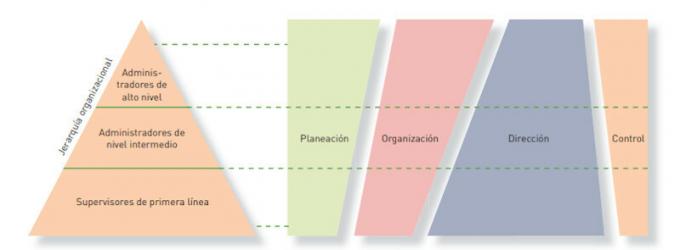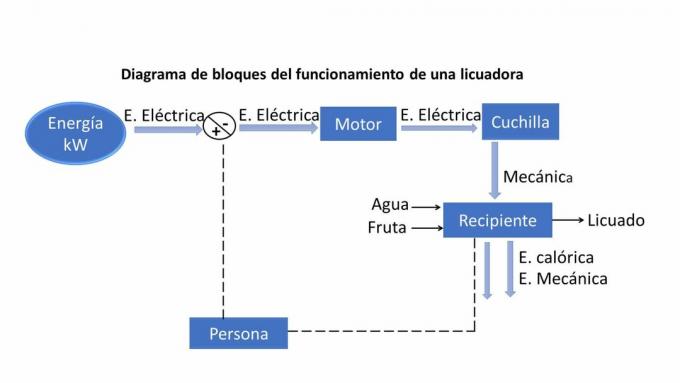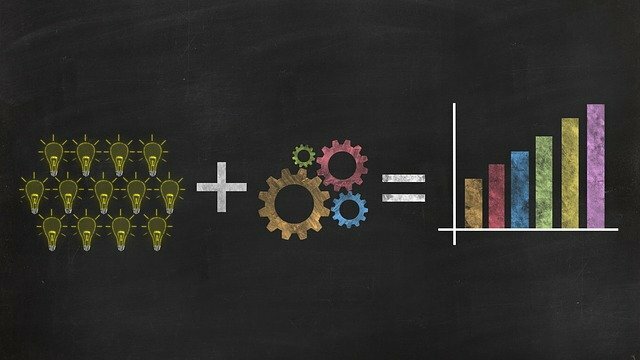Managerial functions at different organizational levels, focus on optimizing administrative management for the achievement of the objectives and goals of the organizations, Through the application of the knowledge of the administrative process.
Well, regardless of the nature of the organization, management functions are based on these processes, hence these managerial functions are broken down into, plan, organize, direct and control.
Advertisements

However, some authors emphasize five functions, Harold Koontz (2012) ", When studying administration, it is necessary to break it down into five managerial functions (planning, organizing, staffing, directing, and controlling), around which the knowledge that underlies" (p. 4).
Advertisements
To understand what management functions are about and the role they play within organizational levels or hierarchies, keep reading this post.
In this article you will find:
What are managerial functions?
Managerial functions are defined as those elementary activities that must be carried out in any administrative position, in order to meet the objectives of the organization efficiently.
Advertisements
These functions are universal activities in administrative management, regardless of managerial position; since it is the processes of planning, organizing, directing and controlling that define the administrative activity, as he described it for the first time Henry Fayol, theory that is still valid today.
Managerial functions in organizations
These functions, regardless of the nature of the organization, are based on administrative processes, therefore, the following are administrative functions:
Advertisements
Planning:
This function focuses on definition of objectives and goals, for the optimal functioning of organizations, efficiently managing the resources and activities of the entity, to create added value.
Organization:
The organization, within the managerial role, focuses its efforts on identify tasks and functions to design the divisions of work within each departmental area, identifying interdependencies for coordinate tasks and establish mechanisms that facilitate communication between the different areas departmental.
Advertisements
Address:
Directing the execution of activities is an administrative role that focuses on guide staff efforts towards the achievement of the established goals, for this it is necessary to coordinate and integrate the employees, establishing a leadership system that motivates and trains all work teams.
Control
With this managerial function, the aim is to seek that the results are fulfilled according to what was planned, for this it is necessary to make a comparison of the actual results with the planned ones, which allows identify the adjustments to apply the corrective measures, which direct the process in the right direction correct.
However, control is a function that is applied in parallel to the other managerial functions, in such a way that failures or inefficiencies can be identified as soon as possible during the process.
Importance of administration for any organization
Administration has become a fundamental element for the proper functioning of any organization and the achievement of its objectives, through the efficient use of resources, and the coordination of teamwork to create added value.
Well, regardless of the economic activity to which the organization is dedicated, and whether it is for profit or not, the administration provides a valuable tool for decision-making that directs the entity to the achievement of objectives and goals.
In addition, whether it is a business, a foundation, a hospital, a school, or others, they also require a person to position, to carry out administrative tasks, to manage resources and coordinate activities and teams of worked.
Managerial functions at different managerial levels
Management functions, although they are universal functions applied to any type of organization, Each manager may have different degrees of participation or responsibility in the administrative process.or, according to the managerial hierarchy of the entity.
For, Harold Koontz (2012), “All managers perform managerial functions; however, the time spent on each function may vary.” (p. 5).
This time spent performing managerial functions describes them Harold Koontz in figure 1.1 in the same book “Management, a Global and Business perspective”, as seen below.

Based on this graph, it can be easily visualized and understood that, although all the administrative hierarchical positions fulfill functions within the administrative process, the level of participation of these in the process are different, therefore, the activities and responsibilities are assigned based on it.
Starting from the organizational hierarchy, three levels can be broken down:
High-level administrators
Are the highest administrative authority of the company, his activities are focused on coordinating other people, defining the objectives to follow and design thestrategic planning, whose decisions have long-term implications for the company.
Therefore, it is a charge requires experience, knowledge and leadership so that the decisions made are assertive.
The functions within the administrative process are mainly:
- Establish goals and strategies.
- Establish projections with long-term implications.
- Evaluate results.
Mid-level administrators
This middle management level is responsible for establishing tactics to achieve the objectives of senior management, which they allow, coordinating the activities to be followed with the first-line supervisors.
Basically, this level is made up of area managers, such as production manager, sales manager, among others.
The main managerial functions of this middle level are:
- Schedule the activities.
- Supervision.
Front line supervisors
Also known as first level managers, because these have direct contact with workers of the company, in charge of directing said personnel, based on operational plans, supervising the execution of daily activities, in order to fully comply with the indications established by the level medium.
These are supervisors with or without professional administrative training, such as supervisory worker, sales supervisor, cleaning supervisor, among others.
First-line supervisors are responsible for managerial functions such as:
- Control in the fulfillment of obligations, such as schedules and responsibilities.
- Direct execution of activities.
- Integrate the staff.
- Monitor work performance.
Bibliographic references:
Harold Koontz, et al, (2012) "Management. A Global and Business perspective”; Mexico. McGraw-Hill/Interamericana Editores S.A. of C.V.


